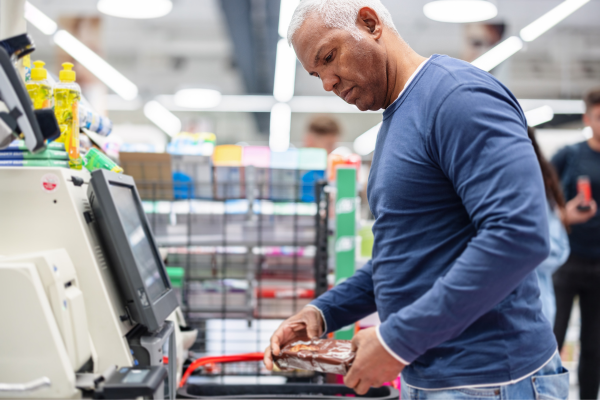
There’s a good chance you are properly fed up with hearing “something unexpected in the bagging area” when you go shopping. Then you have to wait for an assistant so you can prove that you are over 25 just to buy alcohol-free beer. Self-checkouts save supermarkets loads of money on staff costs. But they frustrate their customers in significant ways. And that’s before you start to get annoyed by other shoppers who clearly cannot use the devices and are holding up the queue.
When I was a child, my mum used to write a shopping list. We’d then toddle down the road to the local Co-op and she would hand over the list. The man behind the counter would pack everything up into her shopping bags and we’d slowly walk back home. It was all so simple. If you can think of “Arkwright” or “Four Candles” you know what I mean. If you don’t understand that last sentence, then where have you been for the last 40 years…?
Those shops, such as the corner store in the TV series “Open All Hours” were based on personal service. True, Arkwright himself had a rather odd definition of customer service. Perhaps he learned it from his mate in the shop selling four candles. Those shops, though, involved a person serving a customer – not a machine.
For shops, the self-checkout is an attractive proposition. It saves on staff employment costs as well as training. They can work 24 hours if wanted. And they don’t need four weeks holiday a year.
For customers, self-checkouts are also appealing. They tap into our desire for “convenience”. Our brains want everything done in the most convenient way. It’s about saving our body’s resources in case we need to “fight or flight”. If we choose the least convenient way of doing things, we expend more energy and therefore may not be able to cope in an emergency. Hence our brains are always seeking the quickest and most convenient way of doing everything.
However, the apparent convenience of the self-checkout is an issue. According to research just published from the University of San Diego, self-checkouts are disconnecting us emotionally from the store. That’s the reverse of what the supermarkets want. When comparing self-checkouts with a till operated by a person, shoppers feel much more loyal when they deal with a human.
What this study shows is that the “human touch” is vital in the emotional connection between our businesses and our customers. Yet all around us we are faced with advice that is essentially reducing that human touch. After all, you can hardly move for advice on “how to use AI in customer service” and other such supposed methods of grasping the new technological future. Even the consultancy firm McKinsey has provided a complete plan for implementing AI in customer service. Yet a study in China showed recently that AI enabled customer service is viewed more negatively.
We are attracted by technology like AI because of our drive for psychological convenience – to save energy resources in case of an emergency. Yet another part of our brain, our emotional centre, is craving the human touch. Our task in business is to find the appropriate balance between the two. It looks like the self-checkout has tipped the balance too far in terms of convenience, reducing customer loyalty as part of that process. Indeed, one small supermarket chain in the UK, Booths, has ditched self-service checkouts in favour of people.
Strangely this all links to a conversation I had with my son during the Christmas break. He was talking about the work he had lined up and how he was adjusting his “to do” list. I wondered what software he used. After all, he’s a 24-year-old “digital native” so he was bound to be using something like I do (Todoist). “No way,” said my son, “I use pen and paper.” He explained it made him feel more connected to his plans. Of course, he is right. That emotional connection beats the convenience of software.
So, the question I need to ask myself – as we all do, perhaps, – is whether I am tipping the balance too far on the “convenience” side and not enough on the human emotional side.
The supermarket study shows that self-checkouts may be frustrating, but we trade that annoyance for the apparent convenience. Yet, we much prefer the human touch in the supermarket, which clearly gives us a greater emotional connection to the store. The self-checkout has tipped the scales in the wrong direction.
How far have you favoured convenience in your business instead of the human touch? That online “contact us” form instead of a phone number, for instance. Focusing on that human touch could bring you a much better 2024 than you had in 2023.
If you want confirmation, just read the latest Forbes guide on “How to improve customer service in 2024” where their number one tip is “make it personal”.

